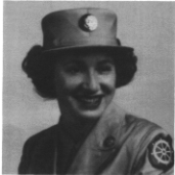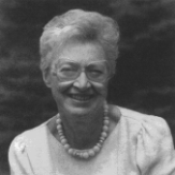




There are two sides to Judith Cohen. There is the up-beat, enthusiastic side of her that I first encountered. Later on, I discovered a more serious side. She spoke in low tones, and appeared possessed by a greater force, almost enchanted. Life was difficult before World War II. Her father had a hard time finding work during the Depression. Life was a game of hop-scotch between homes. Business would go bad and her family would move, again and again. Finally they moved to a small flat on Taft Street in Providence and Judith went to Hope High School.
My big worry at that time, as I remember, in 1939 and 1940 was whether I was going to be able to go to college. Nobody in my family had ever been to college, but I wanted to go.
Judith Cohen took a job at the Outlet Department Store after graduating from high school. It was a time when she felt her dreams rise.
I worked from January 1940 to September 1940. My father had $100 that he had saved, and he borrowed $100. I earned $100, and got a $100 scholarship. The tuition was $400, and I started college.
At that same time, war rumors filled the good times atmosphere that Judith had just begun to experience.
We weren't at war yet, but we were beginning to hear what was happening in Germany. We were all very frightened.
An aunt and uncle of my father's came over from Germany. The uncle came first, and then his wife and his children came later. They were on the last ship Hitler allowed to leave. That uncle could not come to this country unless somebody here would support him if he ever couldn't get a job. My father did not have much money. He just had his job and no savings at that time, and the real struggle with hoping he could educated his children. But father was the one who signed for my uncle to come. If it hadn't been for my father, they would have all been wiped out. Any family that was left was gone. My aunt's mother stayed there. They couldn't bring her, and they heard that she died of starvation in a concentration camp .
So, those were the sorts of rumors that you were starting to hear. You didn't know about all the killing, about the Holocaust, but you started to hear things. Especially if you were Jewish, you were beginning to be frightened by it.
I had just begun to see the other side of Judith Cohen. The side whose door was opened by the coming of the war.
As more and more news came out of Germany, you just felt you wanted to do something. Hirohito was going to dominate half the world and Hitler the other half, although they both said they wanted to dominate the whole world. Hitler's plans were to wipe out the Jews all over the world. It wasn't just wiping out the Jews, it was to take over the United States. I don't think you needed propaganda. All you had to do was read Hitler's book Mien Kampf, and it was all spelled out there.She seemed to see it as if it were yesterday.I think we were all very much worried about what was going to happen to us, and to our way of life.
Judith graduated from Pembroke College and in a short while decided to join the Women's Army Corps (at that time the Women's Auxiliary Army Corps) or WAAC's.
I was the kind of person -- I still am -- that liked to be involved in things.Judith was sent to Georgia for basic training. That was the one time I saw the real segregation in the South. Buses with the Blacks having to sit in the back, and drinking fountains labeled "White Only."
We had all led a somewhat protected life. I probably more so, because I was younger than everybody. I had never heard that kind of swearing and vulgarity. There were women who just talked that way constantly. There were women, particularly from the South, who had never had been in a place with a flush toilet. These women were very, very poor. Many of them joined the army to get fed. I had never known people like that.
Judith was assigned to the New York Port of Embarkation to do what she really wanted to do -- work in the Public Relations Department on an Army newspaper. She was paid $50 a month to start, but her room, board, and clothes were provided -- much different from her earlier job with a small New York newspaper.
That $50, to me, was the first real spending money I had ever had in my life.
Judith experienced prejudice first hand, as she recalled: Once I was in the base hospital, supposedly asleep, and somebody started making remarks about Jews. I didn't say or do anything that time. Then it happened again the next day -- this time I got up and criticized her very strongly. She never said anything like that to me again. She spoke against Italians. She spoke against Blacks.
She told a story of her own college. I do remember something very striking at Pembroke. There was a Black woman in my class, and she could not live in the dormitory. My friends and I were very upset, but at that time, nobody knew about activism. You respected teachers, deans, and so forth. You wouldn't dream of going and complaining about something. You never had heard about anybody who had started a movement, or had a protest. When I went into the WAC's, I was friendly with a woman who had gone to Vassar College. The same thing had happened at Vassar, but they had a protest. I was struck by that. This Black woman did drop out of college the second year, and we felt very badly about it. I wish now that we had done something about it. There was also anti-Semitism that we didn't know about at the time. I recently read an article in the Rhode Island Jewish Historical Association Notes, about a quota for Jewish women at Pembroke. While I was there, there was a quota for Jewish women in the dormitories.
I mentioned that I was Jewish. I felt that I was going out on a limb and felt awkward that she made no immediate response.
Those were the days when you never told people you were Jewish. You just...it didn't come up in...I don't remember how old I was the first time I said " Well, you know," to somebody "Well, you know, I'm Jewish." That took a lot of courage to do.
When war ended, Judith left military service. Although the army had given her many memories and experiences, the most important thing that it would give her was the GI Bill.
My husband to be was still over seas. I just suddenly got this brilliant idea of going to graduate school. Both Judith and her husband went back to college on the GI Bill.
A few years after the war, Judith married, earned her master's degree, and had children.
There was the feeling that the kind of slurs, insults, and jokes that people make about minorities had helped lead to Hitler. I can remember saying, "When you start thinking of other people as just the butt of a joke, it's not that far off to thinking they're not human beings, and you might as well burn them up and make them into soap." I think there was a very strong feeling after the war that there wasn't going to be that kind of discrimination again.
Judith Cohen seems to still have this optimism today. The war had broadened her horizons socially and economically.
The things that affected my life were the Depression, the Holocaust, World War II, and the Vietnam War. I think there were some personal, good things that came out of it - meeting my husband, meeting lots of other people, living a different kind of life, being in the armed services, meeting the women from Vassar and finding out about activism, many things that helped me develop as a person. I don't recommend war as the way to develop as a person, but I think that it did have an effect on me -- probably changed me.
Copyright 1995